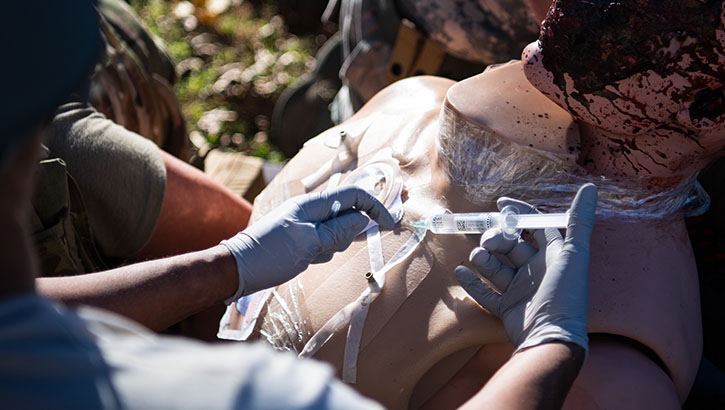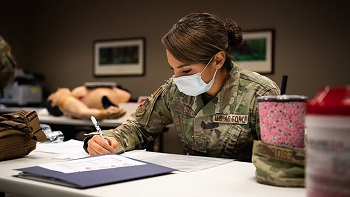Barksdale AFB trains medics with Tactical Combat Casualty Care
 Air Force Capt. Marsha Bennett, 2nd Operational Medical Readiness Squadron nurse manager of the flight medicine clinic, provides tactical field care to a training dummy during a Tactical Combat Casualty Care field training exercise at Barksdale Air Force Base, Louisiana in early Dec. 2020. TCCC is developed by the U.S. Department of Defense Defense Health Agency (DHA) Joint Trauma System to teach evidence-based, life-saving techniques and strategies for providing the best trauma care on the battlefield. (Air Force photo by Airman 1st Class Jacob Wrightsman)
Air Force Capt. Marsha Bennett, 2nd Operational Medical Readiness Squadron nurse manager of the flight medicine clinic, provides tactical field care to a training dummy during a Tactical Combat Casualty Care field training exercise at Barksdale Air Force Base, Louisiana in early Dec. 2020. TCCC is developed by the U.S. Department of Defense Defense Health Agency (DHA) Joint Trauma System to teach evidence-based, life-saving techniques and strategies for providing the best trauma care on the battlefield. (Air Force photo by Airman 1st Class Jacob Wrightsman)
12/30/2020
By:
Air Force Airman 1st Class Jacob Wrightsman
Medics of the 2nd Medical Group are becoming a whole lot more lethal, in a good way.
With the implementation of the Tactical Combat Casualty Care guidelines and the TCCC training course, Barksdale’s medics are training to become increasingly proficient in providing first line trauma care and prehospital medicine in a combat zone.
“The goal of the 2nd Medical Group is to keep folks safe and healthy in all sorts of environments,” said Air Force Col. Erich Schroeder, 2nd Medical Group commander. “Whether it’s treating patients here in the clinic or providing care as we deploy and go into harm's way, this is what TCCC is all about.”
As the official guidelines of the U.S. Department of Defense, TCCC prioritizes decreasing preventable combat death by specifically training airmen on providing care under fire, tactical field care and tactical evacuation care.
TCCC’s heavy emphasis on combat specific medical care differs from previous training guidelines as it provides specialized training to regular forces.
“TCCC is not your average stateside Bossier City or Shreveport medical care -this is designed for combat,” said Air Force Lt. Col. John A. Camacho-Ayala, 2nd MDG health care integrator and director of medical management. “It was developed by Special Forces and after previous Secretary of Defense, James Mattis, saw the success rate of their preventative casualty deaths, it has since become the standard of care across the DOD.”
 Air Force Staff Sgt. Johanna Esquivel, 2nd Operational Medical Readiness Squadron medical technician, takes a test during a Tactical Combat Casualty Care class at Barksdale Air Force Base, Louisiana in early Dec. Barksdale medics must take a three day course to be trained on the new TCCC guidelines. (Air Force photo by Airman 1st Class Jacob Wrightsman)
Air Force Staff Sgt. Johanna Esquivel, 2nd Operational Medical Readiness Squadron medical technician, takes a test during a Tactical Combat Casualty Care class at Barksdale Air Force Base, Louisiana in early Dec. Barksdale medics must take a three day course to be trained on the new TCCC guidelines. (Air Force photo by Airman 1st Class Jacob Wrightsman)
At Barksdale, TCCC has been drilled into the minds and actions of Barksdale’s medics by the means of a three day, hands-on class.
“Over the past 20 years of combat that we’ve had, a lot of the evidence based practices and lessons learned have been incorporated into the TCCC course,” Camacho-Ayala said. “I always tell folks that these lessons were written in blood, because someone had to get wounded in order to implement these actions.”
The lessons taught to the medics attending the course are put to the test on the final day as the students run through a real-world field training exercise. Complete with life-like dummies, smoke machines and simulated gunfire, the medics must tactically provide care under fire, provide tactical field care and finally provide rapid evacuation care.
“With the dynamics of hearing the shooting and the alarms going off, the training really puts you in the field,” said Air Force Senior Master Sgt. Melissa Sartain, 2nd Maintenance Squadron first sergeant and student of the TCCC course. “As medical personnel who don’t carry weapons as often, being able to go out there with the weapon, with the Kevlar helmet plus the gear, securing your weapon and still providing care and doing it tactically is an important piece as we go down-range.”
All-in-all, the new standard of TCCC is designed to save the lives of those in combat. By providing Barksdale’s medics with tactical field training, the 2nd Medical Group will do just that.
“This is the way forward, not just for the Air Force but the DoD as a whole,” said Camacho-Ayala. “It’s paramount that we train our folks not just to competency but to make sure that they are proficient in the way we care for patients. Our main goals as medics is to provide that care that we promised to our fellow soldiers.”